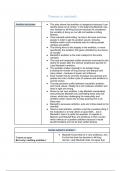Summary
Summary Overview of the themes present in Macbeth
- Module
- Institution
- Book
This document provides and in depth explanation and summary of every theme that is present in the play Macbeth, By William Shakespeare. As the theme is listed in a table format, then it is followed by an explanation and lastly with quotes that are related to that specific theme. At the end of t...
[Show more]



